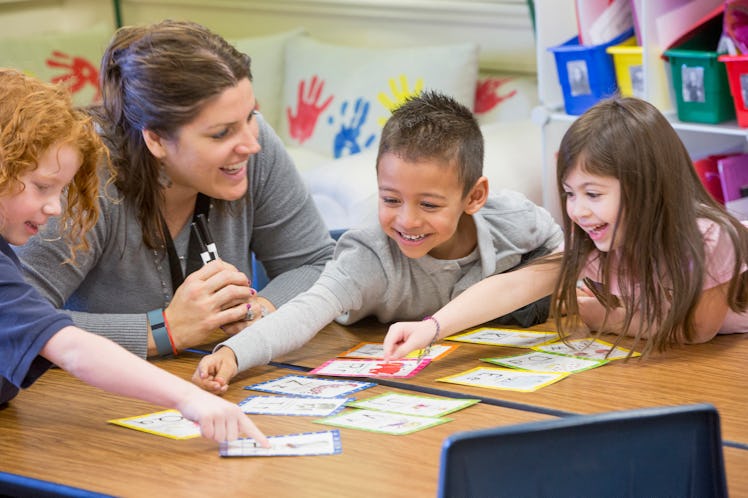Data Clearly Shows Preschool Benefits Kids — And Society As A Whole
The U.S. government invests $37 billion per year on early childhood programs. And it’s working.

Three- and 4-year-olds belong in preschool. This is the consensus of psychologists, pediatricians, and researchers who have dedicated their careers to analyzing the costs and benefits of educating children so young they can seldom pronounce the word “education.” And the United States is convinced — 42 states and the District of Columbia spend about $37 billion each year to ensure that low-income kids don’t miss out — but not convinced enough to implement a national universal pre-k program or spend more than half the percentage of GDP that Spain and Israel cough up annually for preschool.
“The scientific rationale, the uniformly positive evidence of impact on kindergarten readiness, and the nascent body of ongoing inquiry about long-term impacts lead us to conclude that continued implementation of scaled-up pre-k programs is in order,” according to a recent consensus statement authored by the biggest names in early childhood development.
Indeed, studies suggest that kids who attend preschool are more likely to finish high school and go on to college. Even in the short-term, kids enrolled in preschools that stress math and literacy outperform their peers on standardized tests. As for cost, some programs are so effective at reducing crime rates that the U.S. saves $10 for every $1 spent on preschool education. Here’s a breakdown of the numbers behind these conclusions.
Send Your Kids To Preschool, Expect A Master’s Degree
Passion for education starts in preschool. Several longitudinal studies have followed the effects of preschool several years down the road, and concluded that children who partake perform better in elementary school and are more likely to graduate high school. A study in JAMA Pediatrics followed 1,400 children until they were 35 years old, and found that preschool alumni were 48 percent more likely than their peers to obtain at least an associates degree.
Here’s a visualization of the study’s conclusions:
But Don’t Just Send Them To Any Preschool
Not all preschool curricula are created equal. A 2017 working paper suggests that preschools that teach both math and literacy are by far the best at preparing kids for future academic endeavors. The authors collected their data from 417 estimates of curricula impacts drawn from 34 studies, and measured that impact with complex statistical analyses. Technically, they weighed each estimate by the inverse of its squared standard error. Think of it like this: A 0.41 standard deviation difference should translate to 41 SAT points.
One note: the holistic “whole child” approach to preschool, which favors child-centered, active learning over traditional classroom environments, performed quite poorly in this analysis. So consider avoiding preschools with petting zoos and no desks.
Done With Pre-K? Your Tax Dollars Are Well-Spent On Others
There aren’t a whole lot of government investments that boast better dividends than preschool. Numerous studies have demonstrated that society spends between $7,000 and $9,000 per preschooler, but sees at least a two-fold return on that investment. The largest benefits are usually in crime savings — one study from 1980 found that every $9,000 spent on preschool in Chicago saved the city $42,000 in crime-related costs, and that every dollar invested saw a return of $3.39 in earnings and tax revenue from these children who matured into adults who abided by the law, pursued higher education, and earned high salaries.
The following data comes from a 2017 meta-analysis by the Brookings Institution. The researchers converted dollar values to 2016 dollars, and highlighted cost-benefit ratios.
This article was originally published on